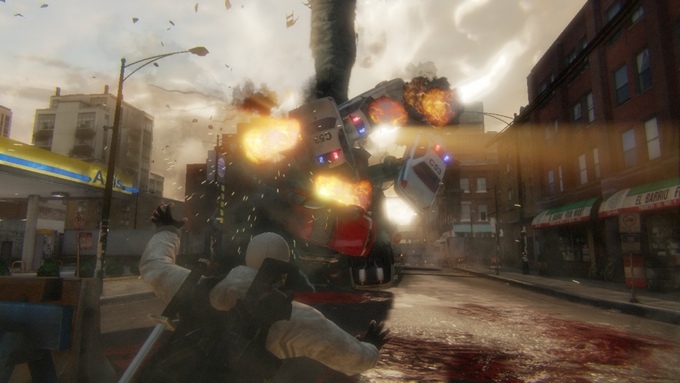Phosphor Games has been waiting almost 10 years to make its dream superhero game.
The developer’s latest project, Gemini: Heroes Reborn (coming to PlayStation 4, Xbox One, and PC on January 12), isn’t that game. But it is another crucial waypoint in Phosphor’s long and winding journey of trying to get its idea off the ground. Loosely based on the Heroes Reborn TV show, Gemini is a first-person action adventure that tells the story of Cassandra, a young girl who must use her newfound powers to save herself and her friend from a shadowy government organization.
While playing Gemini at a recent press event, I saw traces of Phosphor’s opus — it previously went by the names Hero and Project Awakened — in the game’s creative use of powers. Even though Hero and Project Awakened never came out, Phosphor’s ongoing efforts to revive those ideas was what led it to work on Gemini and other Heroes Reborn games in the first place.
It almost seems like fate. But to understand how Phosphor ended up here, we have to start at the beginning — back when its first employees were still a part of the now-defunct Midway Games.
When superheroes weren’t cool
Thanks to an onslaught of recent comic book movies and TV shows, superheroes have become more popular than ever. People no longer have to hide their love for characters like the Guardians of the Galaxy, Iron Man, or Supergirl.
But that wasn’t the case back in 2006. Around that time, Midway Chicago conducted a focus test where it asked participants what kind of characters they’d like to play as. Among the choices the developers included were Altaïr from the first Assassin’s Creed game, characters from G.I. Joe, Tomb Raider’s Lara Croft, and superheroes like Batman and Superman.
“All of the [other] game characters were picked well over the superheroes,” said Phosphor cofounder and director Chip Sineni to GamesBeat. “Nobody wanted to be these characters in tights. Tights like that were just not cool.”
At Midway, Sineni was part of a small team working on Hero, a huge open-world game for consoles that would let players customize their own superhero with different looks and powers. The team realized it could never create the ultimate superhero character, so it wanted to give players the chance to make their own.
The core idea of Hero was about ordinary people in the real world suddenly gaining powers, and it was up to the player to decide how to use them.
“How would you twist that everyday [experience with your powers]? What would you do if you could slow down time? … What would you do at Starbucks? Would you get ahead of the line?” said Sineni.
Coincidentally, 2006 was also the year the NBC show Heroes debuted. It had a similar name and premise to Midway’s game. But while the show would last four seasons, Hero never saw the light of day: Midway cancelled it after two years of development. In an interview with Gamasutra in 2011, Sineni talked about how chaotic that time was, where “everyone was in denial that Hero wouldn’t get made, somehow.”
Midway later filed for bankruptcy in 2009 (Warner Bros. subsequently acquired most of its assets for $33 million). Sineni and other former employees moved on and founded Phosphor Games Studio in Chicago. Their goal was to keep Hero — or at least its ideas — alive in a new game. But without access to their work at Midway, they had to start over.
One door closes …
Phosphor quietly toiled away on its spiritual successor to Hero while doing contract work and creating the mobile games Horn and Dark Meadow. Dubbed Project Awakened, the new game retained Hero’s customizable character options, but it was no longer focused on an open world. Phosphor also decided to target PC instead of consoles. The studio showed it around to different publishers, and while many of them liked the concept, no one was willing to make a deal.
In 2013, Phosphor decided to put Project Awakened’s fate in the hands of potential players by launching a crowdfunding campaign on Kickstarter. Sineni and others featured in the pitch video promised a dynamic world that’d respond to how you played the game. But Phosphor fell short of its $500,000 goal, raising just $338,498.
“I think one of the reasons why that hasn’t come out is [because] how the industry has really shifted. About every year, we get a publisher who’s super interested in it — ‘Can we still make that game?’ But the whole economics of game-making keeps shifting. These days, it does seem like you either have really huge triple-A type games with hundreds of people and costs upwards of $40 million [or a small indie project that becomes popular]. … Project Awakened is the kind of game that really does need a staff and budget.”
The developer also tried taking private donations, but that didn’t work out, either.
Once again, the team had to put its dream aside to work on other games. But at least one good thing came out of its failed crowdfunding attempts.
Earlier this year, Heroes came back on NBC after a five-year absence with the semi-reboot Heroes Reborn. And publisher Imperative Entertainment (cofounded by the show’s creator, Tim Kring) wanted to make games based on the series. Imperative’s Brad Santos liked what he saw in the Project Awakened Kickstarter and thought Phosphor Games would be perfect for the job.
So far, their collaboration involves two interconnected games. In October, Phosphor released Heroes Reborn: Enigma for iOS and Android, a first-person puzzle-solving game akin to Portal. The more combat-heavy Gemini continues Enigma’s story from the perspective of a different character.




